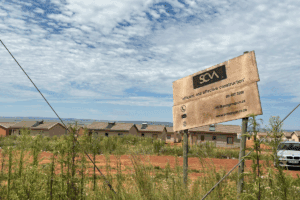The DA was quick to point out that the Western Cape, the only province it governs, was regarded as having the best audit outcomes.

Opposition parties slammed the government after Auditor-General Kimi Makwetu revealed the “disappointing” audit outcomes for the 2018/2019 financial year for provincial and national governments on Wednesday.
Makwetu said political leaders, accounting officers and authorities as well as oversight structures “must take immediate action to restore the government’s accountability to the people of South Africa”.
“This could be done by acting on the outcomes of the recent audits, dealing effectively with material irregularities [Mis] that have been identified, and implementing preventative controls to turn the tide of undesirable stewardship over public funds,” he added.
His report, titled Act Now on Accountability, reveals “disappointing” audit results for 2018/2019 and “slow progress” over the five previous financial years.
Makwetu attributed the stunted growth to the desired audit outcomes largely to those charged with governance being slow to implement, or totally disregarding, audit recommendations made by his office.
DA spokesperson on cooperative governance and traditional affairs Haniff Hoosen said the report was a “clear indication that all the tough talk on cleaning-up government is nothing more than hot air which has amounted to nothing”.
“The Auditor-General report has indicated that irregular expenditure at government departments increased from R51bn in the 2017/2018 financial year, to an alarming R62.6bn in the current financial year,” he said according to a statement.
“Despite the sorry state of our economy and joblessness, national departments continue to squander money without a shred of accountability,” said Hoosen.
“Fat cat officials are recklessly abusing the public coffers through irregular expenditure while our communities are left wanting on the projects and infrastructure they so desperately deserve.”
He said to make matters worse, not a single state-owned entity received a clean audit.
“This begs the question why the government continues to waste public monies to bail out entity after entity when they cannot even be trusted to utilise the monies effectively?”
He said the government needed to get serious about cleaning up the rot before it was too late.
The DA was quick to point out that the Western Cape, the only province it governs, was regarded as having the best audit outcomes.
“Effective and efficient governance is possible in South Africa as demonstrated by the Democratic Alliance,” Hoosen said.
“The Auditor-General went so far as to commend the political and administrative leadership of the province for this noteworthy achievement.”
Western Cape Finance MEC David Maynier said in a statement: “These audit outcomes reflect a continued effort to not only prioritise good governance, but also to be constantly seeking to improve in the way we manage provincial finances.
“We are proud to have maintained our reputation as the best performing province in South Africa, and we will continue to work hard for those living in the Western Cape.”
IFP spokesperson on finance and public enterprises Mzamo Buthelezi said the AG’s report was “reason enough to kick-start the process of selling off what we cannot afford”.
“It is high time that the country reopens the debate on the partial privatisation of SOEs which have drained the state coffers and continue to abuse resources which could be better spent in delivering dignified, quality, effective and efficient services to all South Africans,” he said in a statement.
“It is unfathomable that we are bleeding billions against the already austere and grim backdrop of sluggish economic growth and the ever-increasing debt-to-GDP bill.
“We simply cannot, year-on-year, report and condemn financial year-end results and then think that it is OK to turn around and condone gross neglect, the rot of corruption and underperforming entities.
“In striving for excellence, we must shake off the culture of mediocrity we have accepted from the government, SOEs and private companies.”
The FF Plus’ spokesperson on finance, Wouter Wessels, said in a statement South Africa had good legislation for financial management, but the ANC had failed to adhere to the legal prescripts.
“It is clear that the ANC government only sees the legal prescripts as guidelines and don’t do what is expected of it. Officials are also not held accountable,” Wessels added.
“The audit reports paint a grim picture of regress and is in line with the reality of poor service delivery and the complete decline of the financial position of South Africa as a whole.”
He said action must be taken against the officials who did not obey the law and that departments must be turned around.
“It is, however, clear that the ANC doesn’t have the political will or capacity to do this.”
The chairperson of parliament’s standing committee on the auditor-general, Sakhumzi Somyo, expressed his concern about the audit outcomes.
“It is very concerning that irregular expenditure has increased from R51bn in the previous financial year to R62bn. The committee understands that this figure could even be higher due to the fact that some contracts could not be audited due to missing information,” he said in a statement.
He added this showed there was a lack of adherence to the Public Finance Management Act and in some cases possible financial mismanagement by those who had been entrusted to manage the public purse. “The committee is also concerned with the increase in fruitless and wasteful expenditure.
“The AG paints a bleak picture by these results at a time when the country should be prudent in how it spends taxpayers’ money. The committee hopes that institutions that are tasked with holding the national and provincial governments accountable will be able to tackle the root causes that lead to these kind of results so that the country can eventually see a decline in irregular, fruitless and wasteful expenditure,” Somyo said.
For more news your way, download The Citizen’s app for iOS and Android.






